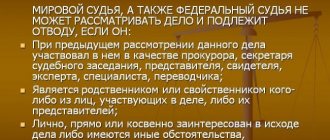Art. 51 of the Code of Criminal Procedure of the Russian Federation defines various types of cases of a criminal nature, if the proceedings at the hearing of these cases must be carried out with the participation of a defense lawyer. This is how government agencies ensure that certain individuals are adequately protected and minimize the chances for investigators and the judge to make mistakes.
Multi-channel free hotline Legal advice on criminal law. Every day from 9.00 to 21.00
Moscow and region: +7 (495) 662-44-36
St. Petersburg: +7 (812) 449-43-40
What does the article say? 51 Code of Criminal Procedure
In this article, attention is paid to:
- cases of mandatory participation of a defense attorney in criminal proceedings;
- the procedure for ensuring the participation of a lawyer in the process.
Art. 51 of the Code of Criminal Procedure contains many references to related provisions of the law. It must be considered taking into account the provisions of a number of other articles of the Code of Criminal Procedure.
Basic provisions of Art. 51 Code of Criminal Procedure
The norm of the Code of Criminal Procedure in question consists of three points. The first deals with the mandatory participation of a defense attorney in a criminal case. In other words, similar cases are listed.
They are:
- The accused or suspect did not refuse a lawyer, in accordance with the procedure established by 52 articles of the Code of Criminal Procedure. That is, he did not submit a written petition.
- The suspected or accused person has not reached the age of majority. The fact of emancipation does not matter.
- Due to health conditions, the accused or suspect does not have the opportunity to independently exercise the right to defense. Confirmation of the presence of such features is required.
- Criminal proceedings are carried out using the provisions of the fifth part of Article 247. According to it, the trial can be held without the participation of the defendant. This case of the mandatory presence of a defense lawyer was added to the Federal Law under number 153. It regulates the possibility of proceedings in absentia.
- The person does not speak Russian. It does not matter whether he is a foreigner or, for some reason, does not know Russian, even though he is a citizen of Russia.
- The defendant is charged with a crime punishable by 15 years or more in prison, life imprisonment, or the death penalty. A moratorium has been imposed on the imposition of the latter type of sentence, but the Criminal Code of the Russian Federation provides for such punishment in a number of articles.
- The trial is held with the participation of jurors. The presence of a lawyer is necessary because, due to the specifics of his profession, he will be able to convey to the jury the position of the defense. If a lawyer is absent, then the adversarial argument on which the entire trial is based will not be presented.
- A petition was received from the accused to consider the case in accordance with the procedure provided for by Chapter 40 of the Code of Criminal Procedure. It regulates a special procedure for considering cases where the accused agrees with the offenses charged to him.
- A petition was received from the suspect to proceed with the case, in an abbreviated form. The procedure for considering cases is regulated in this way by Ch. 32.1 Code of Criminal Procedure.
The article in question also talks about who is obliged to ensure the presence of a defense lawyer in the legal proceedings:
- If the accused (suspect) has not refused a defense lawyer, is a person under the age of 18, cannot, due to mental or physical disabilities, independently exercise the right to defense, does not speak Russian, or may receive a sentence of imprisonment for a period of 15 years and above, life imprisonment, as well as the death penalty, then the participation of a defense attorney is ensured in the manner prescribed by Part 3 of Article 49. Code of Criminal Procedure. It states that the subject must participate in the legal process from the very beginning, for example, from the moment of detention of a particular person.
- If the case is tried with the participation of a jury, in a special or simplified manner, then the participation of a defense attorney is considered mandatory from the moment the accused or suspect makes the appropriate request.
- If a citizen has not refused the participation of a defense lawyer in the process, but has not invited him on his own, then the inquiry officer, investigator or court must ensure his participation in criminal proceedings.
Since the adoption of the Code of Criminal Procedure in 2001, this law has been edited more than once. Among other things, the norm in question was subject to revision. In 2006 (Federal Law No. 153), 2007 (Federal Law No. 87) and 2013 (Federal Law No. 23). The changes made significantly affected the perception of procedural norms. To interpret them correctly, you need to study the provisions together with comments given by the RF Armed Forces and theorists in the field of criminal law.
When the provisions of Art. 51 Code of Criminal Procedure?
The application of the provisions of this article in criminal proceedings is mandatory in all cases. If the participation of a defense attorney is not ensured, then in fact all decisions made during the process, decisions and rulings issued automatically lose legal force. The criminal case is sent for further investigation to the preliminary investigation authorities.
Such cases have not yet existed in the legal practice of the Russian Federation. If such assumptions occurred, they were corrected at the pre-trial stage.
Commentary on Article 51 of the Code of Criminal Procedure of the Russian Federation
1. The commented article establishes cases when the participation of a defense attorney in criminal proceedings is mandatory, i.e. does not depend on the will of the person in respect of whom the preliminary investigation and trial are being carried out.
2. Clause 1 of Part 1 of the commented article enshrines a unique presumption of the need to provide a person with a defense attorney in all cases where the suspect or accused has not officially and strictly voluntarily renounced him (Article 52 of the Code of Criminal Procedure of the Russian Federation). Thus, if a person declares that he does not need the help of a defense lawyer, this refusal must be documented.
3. The participation of a defense attorney in criminal proceedings, if the suspect or accused has not refused it, is mandatory from the moment the defense attorney enters the criminal case, which does not prevent seeking help from a lawyer (defender) and receiving qualified legal assistance from the moment of actual detention, limiting freedom and security of person, including freedom of movement. In addition, the requirement to immediately ensure the right to the assistance of a lawyer (defender) cannot be extended to cases of investigative actions not related to the person giving evidence and of an urgent nature, prepared and carried out without prior notification of the person about their conduct due to the threat of destruction (loss ) evidence.
4. According to paragraph 2 of part 1 of the commented article, the defense attorney participates in criminal proceedings in all cases when the suspect or accused is a minor. In this case, the term “minor” should be given a broader meaning than what follows from the letter of the law. A defense attorney is required not only in cases where a person is a minor during a preliminary investigation or trial against him, but also when the person has not reached 18 years of age at the time he committed a crime (Part 1 of Article 420 of the Code of Criminal Procedure of the Russian Federation).
5. Paragraph 3 of the commented article contains a requirement for the mandatory participation of a defense attorney in cases where the suspect or accused cannot properly exercise his right to defense due to his physical or mental disabilities.
6. Physical disabilities are understood as such chronic diseases that do not allow a person to adequately perceive the information coming to him, express his judgments in a way that is accessible to others, and also take an active part in refuting the position of the prosecution. Such disabilities include blindness, deafness, muteness, complete or partial paralysis of the body, etc. Thus, the participation of a defense attorney is mandatory if criminal proceedings are carried out against a person suffering from a significant speech impediment.
7. Mental disabilities are indicated by a person’s illness, as a result of which he is unable to adequately perceive information, realize the nature of his actions and manage them. Although, if the investigator or interrogator has doubts about the sanity of a person or the ability to independently protect his rights and legitimate interests in criminal proceedings by virtue of clause 3 of Art. 196 of the Code of Criminal Procedure of the Russian Federation, the appointment of a forensic examination is mandatory; a criminal justice official should not make the fact of providing a suspect (accused) with a defense lawyer dependent on the results of a forensic psychiatric examination. The suspect or accused must be provided with a lawyer immediately after the fact of his mental disorder is established (for example, a certificate is received from a psychoneurological dispensary about the presence of the disease).
8. Failure to provide a lawyer to a person suffering from both congenital and acquired mental illness is a significant violation of the requirements of the law.
9. The defense attorney, by virtue of paragraph 31 of the commented article, is required to participate in the case when, in accordance with part 5 of the commented article, the trial in criminal cases of grave and especially grave crimes is carried out in the absence of the defendant, who is located outside of Russia and (or ) avoids appearing in court (provided that this person has not been brought to justice in this criminal case in the territory of a foreign state). If a defense attorney has not been invited by the defendant, the court will take steps to appoint a defense attorney.
10. In accordance with paragraph 4 of part 1 of the commented article, the participation of a defense attorney is mandatory in cases where the suspect or accused does not speak the language of criminal proceedings. Thus, the legislator established an additional guarantee for a person who does not speak or does not speak well the language of criminal proceedings, in addition to those established in Art. 18 Code of Criminal Procedure of the Russian Federation.
11. The participation of a defense attorney is mandatory when a person is accused of committing a crime for which a sentence of imprisonment for a term exceeding 15 years, life imprisonment or the death penalty may be imposed. The fact that this requires a charge to be laid means that the rule only applies to the accused.
12. A criminal case is subject to consideration by a court with the participation of a jury (clause 6, part 1 of the commented article) in the cases specified in clause 2, part 1 of Art. 30 of the Code of Criminal Procedure of the Russian Federation, i.e. when, in accordance with clause 1, part 3, art. 31 of the Code, a criminal case, as a general rule, falls under the jurisdiction of the court of a constituent entity of the Russian Federation.
If there are several accused in a criminal case, then the participation of a defense attorney is ensured for each accused from the moment at least one of them submits a request to have the criminal case considered by a court with the participation of a jury.
13. A criminal case in a number of cases may simultaneously fall under the criteria of both clauses 5 and 6 of the commented article. In this case, priority is given to the provisions of clause 5, since in this case a defense lawyer is provided regardless of the desire of the accused, whereas in order to consider a criminal case by a court with the participation of a jury, his petition is necessary (clause 1, part 5, article 217 of the Code of Criminal Procedure of the Russian Federation).
14. In paragraph 7 of part 1 of the commented article, it is stipulated that the participation of a defense lawyer is mandatory in cases where the accused has filed a motion to consider the criminal case in the manner established by Chapter. 40 Code of Criminal Procedure of the Russian Federation. If the accused (with the consent of the public prosecutor and the victim) agrees with the charge brought against him, he has the right to file a petition for a verdict without a trial in criminal cases for crimes for which the punishment does not exceed 10 years of imprisonment (Part 1 of Article 314 Code of Criminal Procedure of the Russian Federation). Therefore, the participation of a defense attorney is a guarantee of the free will of the accused regarding the charges brought against him and the use of an expedited trial procedure.
15. The participation of a defense attorney by virtue of clause 8 of part 1 of the commented article is mandatory if the suspect has submitted a request to conduct an inquiry in an abbreviated form (Chapter 321 of the Code of Criminal Procedure of the Russian Federation). In this case, the defense attorney ensures that the person is protected from illegal and unfounded criminal prosecution. Among other things, the defense attorney has the right to take a position contrary to the position of the suspect if he is convinced of his self-incrimination.
16. Part 2 of the commented article does not establish a single moment from which a person is granted the right to use the assistance of a defense lawyer. This is due to the fact that information about the existence of the circumstances specified in part 1 of the commented article appears at various stages of pre-trial proceedings in a criminal case.
17. In accordance with Part 3 of the commented article, the bodies and officials of criminal proceedings are charged with the participation of a defense attorney in criminal proceedings in cases where the defense attorney was not invited by the person himself.
18. If the participation of a defense attorney in criminal proceedings is recognized as mandatory, then a person who has declared his intention to protect his interests independently, but does not have funds, is provided with a defense attorney with payment for his assistance at the expense of the state.
19. At the same time, a person who falls under the criteria of Part 1 of the commented article has the right to invite a lawyer independently, with payment for his assistance by agreement. If this does not happen, then remuneration is made from the federal budget (Part 5 of Article 50 of the Code of Criminal Procedure of the Russian Federation).
20. If the participation of a defense lawyer in a criminal case is recognized as mandatory, the bodies and officials of criminal proceedings are obliged to take measures to actually ensure the defendant’s right to defense.
21. Consideration of a criminal case without the participation of a defense attorney, when his participation is mandatory, constitutes a significant violation of the criminal procedural law and entails the reversal of the sentence (clause 4, part 2, article 381 of the Code of Criminal Procedure of the Russian Federation).
Consultations and comments from lawyers under Art. 51 Code of Criminal Procedure of the Russian Federation
As many qualified lawyers with experience and extensive practice note, if we are talking about a case that is carried out in accordance with Article 51 of the Criminal Procedure Code of Russia, then it is necessary to work and bring the case to the end. The thing is that within the framework of Article 51, the defender of the accused party has very few responsibilities, and all of them are established in one place.
Actions included under Article 51 of the Russian Code of Criminal Procedure allow:
- carry out more detailed and complete actions, as well as more influencing the judicial process, providing sufficient protection for the accused party;
- give more rights to protect the accused, as well as to analyze the situation that is happening and changing under the influence of new information;
- improve the position of the accused or suspected party within the framework of judicial proceedings.
However, in fact, you should deal with the analyzed case until the very end, and also provide your services at any stage and at each stage of the legal proceedings.
Article 51 of the Code of Criminal Procedure of Russia regulates the provisions, actions, as well as the rights and obligations of such a party as the defender of the defendant, accused or citizen under investigation in judicial proceedings. Based on the points, parts and main provisions, the behavior, powers and possible paths of the investigation during the active actions of the lawyer as a defending party are determined and recorded.
At the same time, a defendant or a citizen who is under investigation always has the right to refuse a defense lawyer if there are reasoned reasons for this. However, in such cases, the defendant will have to provide these arguments to the court.
If we are talking about the incompetence of the defense attorney, then the court will have to provide the accused or, for now, the defendant party with another defense attorney on the basis of Article 51.
Judicial practice under Article 51 of the Code of Criminal Procedure of the Russian Federation
One of the high-profile cases occurred on April 10, 2022 in the Kirov region. The suspect in it is Pervakov V.A. threatened to kill the victim, and the victim had every fear that these threats would become real. This is due to the defendant’s strong alcohol intoxication.
During court proceedings:
- Pervakov was provided with a lawyer as a defender, however, the defendant fully admitted his guilt and received 1 year and 10 months in prison.
- At the same time, the actions of the defender did not go beyond Article 51 of the Code of Criminal Procedure of Russia, and the degree of qualifications and responsibility of the defender were not in doubt.
There are a lot of court cases related to Article 51 of the Russian Code of Criminal Procedure, but relatively recently an updated procedure for the appointment of qualified legal professionals under Article 51 of the Russian Code of Criminal Procedure was introduced.
Legal practice
Examples of legal proceedings using the provisions of Art. 51 of the Code of Criminal Procedure are as follows:
- Minor citizen A was brought in as a suspect in the case of the theft of a mobile phone from citizen N. In accordance with part 2 of the first paragraph of Art. 51 required the involvement of a lawyer.
- Citizen T acted as a suspect in the robbery case. He filed a written request to refuse the services of a lawyer. This petition had no legal force, since citizen T. was mute from birth. Art. 51, part 1, paragraph 3.
- During the investigation of a criminal case regarding the double murder of a married couple I. based on national hatred, citizen N., brought in as a suspect, refused the participation of a lawyer. The request was not granted in accordance with Art. 51, part 1, clause 5.
Examples of application of the provisions of Art. 51 is quite a lot. They occur in the practice of criminal proceedings every day.
What decisions are made in accordance with the provisions of Art. 51?
In accordance with the provisions of the article in question, only unambiguous decisions can be made. If there is a case in which the presence of a lawyer is mandatory, then one is involved. There can be no other options.
Having a lawyer in criminal proceedings is a huge plus for a suspect or accused. As practice shows, a lawyer hired at his own expense is more motivated. If there is no money to pay for his services, then you should not neglect the help of a specialist appointed by the state.
When is it possible to refuse a lawyer?
In Art. 51, part 1, paragraph 2, 3, 3.1, 4-8 lists cases in which it is not possible to refuse a lawyer. In this case, you can refuse a specific lawyer appointed by the state.
This is possible in the following cases:
- at an earlier stage of the process, this specialist advised the civil plaintiff or injured party;
- the lawyer is a relative of any participant in criminal proceedings;
- the lawyer was previously another subject of specific legal proceedings.
Not only the client himself can refuse a specific lawyer. Any other subject of criminal proceedings can voice the need to disqualify a lawyer.
What to do if you are accused of fraud?
Fraud is one of the most widespread and complex crimes encroaching on property rights. Responsibility for it is provided for in Art. 159 of the Criminal Code of the Russian Federation, according to which fraud is the theft of someone else’s property or the acquisition of rights to someone else’s property through deception or abuse of trust. The specificity of committing a crime in various spheres of the economy has led to the identification by the legislator of special types of fraud.
Fraud, as one of the forms of theft, has all its characteristics, but is characterized by its own peculiarity, which distinguishes it from other forms of theft. This feature lies in the method of committing the crime. The law defines two ways to commit a crime: deception and breach of trust. The legislator in the Criminal Code of the Russian Federation decided not to disclose the content of these categories either in the definition of fraud or in the footnote to the article, so we should refer to the resolution of the Plenum of the Supreme Court of the Russian Federation dated November 30, 2022 No. 48 “On judicial practice in cases of fraud, misappropriation and embezzlement,” which explains that deception can be expressed through the following actions: informing a person of information that does not correspond to reality; concealing true facts; misleading the victim.
Breach of trust as a method of committing a crime is associated with the use of trust relationships with the owner of property for personal gain. In addition, this method occurs in cases where a person assumes obligations while he obviously has no intention of fulfilling them in order to use someone else’s property for his benefit free of charge (this can be said in cases where a person receives an advance for the work that he obviously did not intend to perform). In such situations, the complexity of the case will lie in the need to prove the occurrence of intent on the part of a person before receiving someone else’s property or the right to someone else’s property.
The damage caused is of great importance for the qualification and reclassification of the act. Below is a table indicating the amount of damage associated with the imputation of one or another part of Art. 159 of the Criminal Code of the Russian Federation.
| Article 159 | Amount of damage, large and especially large | Crime Category | |
| part 1 | from 2,500 to 5,000 rubles, if the victim is a citizen; from 2,500 to 250,000 rubles, if the victim is an individual entrepreneur or organization | Light weight | |
| part 2 | Victim-citizen – at least 5,000 rubles. | Moderate | |
| Part 3 | from 250,000 to 1,000,000 rubles. | Heavy | |
| part 4 | from 1 million rub. | Heavy | |
| part 5 | not less than 10,000 rubles, but not more than 3 million rubles | Special subject composition and sphere of emergence of social relations | Moderate |
| Part 6 | from 3 million rub. up to 12 million rubles | Heavy | |
| part 7 | from 12 million rubles | Heavy | |
As a rule, the basis for initiating a criminal case in cases of fraud are statements from citizens and organizations. A pre-investigation check is carried out, within the framework of which various procedural actions, including investigative ones, can be carried out. So, using all our capabilities within the framework of Art. 144 of the Code of Criminal Procedure of the Russian Federation, the investigator can request documents, inspect them, conduct audits, and obtain explanations from persons who are under suspicion. Already at this stage, the professional assistance of a lawyer will be the key to the most favorable outcome of the case for you.
Criminal cases of fraud may be custom-made, directed against persons engaged in business activities. The wording of the definition and the lack of precise regulation of methods of committing fraud turn this article into a weapon that is used to get rid of competitors in the market.
Cases of failure to fulfill obligations under civil contracts are often classified as fraudulent actions. The criterion for distinguishing between a crime and a civil dispute in such cases comes down to the subjective perception of the situation by the person who allegedly committed the crime. It is necessary to prove the presence of direct intent on the part of the person to fail to fulfill the obligations assumed at the time of concluding the contract. In practice, the facts that prove the presence of intent to commit illegal actions include the following: the use of forged documents (passport, charter documents, letters of guarantee), seals, signatures, concealment of debts from the counterparty, collateral of property, lack of a real opportunity to fulfill obligations assumed under the contract obligations, presence of signs of the organization (lack of an actual office, staff, lack of payments to the tax office, and so on).
But in practice, situations may arise when, after concluding a supply contract, the customer cannot pay for the supply of goods due to the deterioration of the situation in the market for certain services or goods. Thus, the person did not have any initial intent to commit actions that fall under the characteristics of fraud. A correctly constructed line of defense will be aimed at justifying the lack of such intent on the part of the suspect when he committed certain actions and proving their civil nature. If it can be proven that there was no intent, the defendant is found not guilty.
In order to avoid becoming a victim of unscrupulous persons who skillfully manipulate facts, it is necessary to seek the help of a lawyer in the following cases:
- if the mistakes you made while conducting economic activity led to negative material consequences for your creditors;
- when a counterparty threatens to file a statement about a crime you have committed;
- when called to law enforcement agencies in connection with a statement received from your counterparties;
- if you realize that your actions contain signs of fraud.
A lawyer in cases of fraud should be engaged as soon as you come under close surveillance by law enforcement officers. There is no need to wait for charges to be filed under Art. 159 of the Criminal Code of the Russian Federation. If you receive qualified assistance from a lawyer in a timely manner, the chance of preventing negative consequences for you increases. First, you need to understand at what stage the investigation is at. Initial actions are carried out as part of a pre-investigation check, which involves either the initiation of a criminal case or the refusal to initiate one. It is replaced by the preliminary investigation stage, which ends with the transfer of the case to court. From this moment the judicial investigation begins until the sentencing.
If you have committed illegal actions and law enforcement agencies have become aware of these facts, then most likely you are already being considered as a suspect in the case. According to Art. 46 of the Code of Criminal Procedure of the Russian Federation, the status of a suspect is acquired by a person against whom a criminal case has been initiated, a person who has been notified of his suspicion of committing a crime, a person detained on suspicion of committing a crime, or to whom a preventive measure has been applied before charges are filed.
It is advisable to involve a lawyer at this stage, before charges are brought against you, as this will entail a change in your procedural role from a suspect to an accused.
However, this is not a reason to let go! As soon as you are suspected of committing fraudulent activities, be sure to enlist the help of a lawyer.
If you have become the object of close attention from law enforcement agencies and you are being held criminally liable for committing fraud, we recommend that you adhere to the following tactics:
- Refuse to give any testimony and exercise the right, which is enshrined in Art. 51 of the Constitution of the Russian Federation “No one is obliged to testify against himself, his spouse and close relatives, whose circle is determined by federal law.” However, you should adhere to such tactics until a certain moment, until the meaning and scope of the charges from the investigative authorities becomes clear to you, and until you have developed a defense strategy that can more fully and sufficiently take into account your interests.
- If you nevertheless decide to testify, try to convey your position as fully as possible and at the same time be sure to make sure that what you say is correctly reflected in the procedural act;
- Do not seek help and advice from those lawyers who are constantly engaged in the practice of defense under Art. 51 of the Constitution of the Russian Federation, that is, to the so-called defense attorneys appointed by the state (“Pocket lawyers” or “red” lawyers). Because these persons respect the interests of law enforcement agencies more than their clients. The need for such lawyers to pursue the interests of investigative authorities is caused by the risk of losing their job (he will simply not be appointed as a defense attorney in the future and he will lose his income).
In practice, it usually happens that people are threatened with charges under the article “fraud” without any justification. In such situations, you should immediately contact a lawyer who will find out whether there are actually grounds for bringing charges against you, or whether the threats have no basis.
Being under the protection of a lawyer, you will be provided with round-the-clock legal assistance and support. The lawyer’s activities will be aimed at obtaining facts proving the client’s innocence and presenting them in court; obtaining facts confirming the presence of an intention to fulfill obligations when concluding a transaction; reclassification of the crime to a less serious one; minimizing the risk of being sentenced to actual imprisonment.
Article 51 of the Code of Criminal Procedure of the Russian Federation
This article of the Russian Code of Criminal Procedure regulates the mandatory presence of a defense attorney in criminal proceedings, as well as mandatory and additional actions within the framework of the defense of the accused party.
The participation of the defending party (in this case and henceforth, such party will be a lawyer) in the analysis of the crime is mandatory in the following cases:
- If the accused/suspected party has not officially refused a competent defense lawyer and his defense in the manner prescribed by Article 52.
- If the suspect in the crime committed has not reached the age of majority.
- If the person accused of the act is unable to independently defend himself due to physical or mental deficiencies.
- If a citizen or their group, accused or only suspected of having committed an act of a criminal nature, do not speak or cannot for some reason speak the speech and language in which the trial is conducted.
- If a citizen is accused of committing an offense, he may receive a sentence of 15 years or more, as well as life imprisonment or even the death penalty.
- If the accused party has filed an official request for an analysis of the case under consideration in the manner and according to the rules provided for by Chapter 40 of the Code of Criminal Procedure of Russia.
Here, cases of mandatory participation of a defense attorney in criminal proceedings, provided for in parts 1-5 of this article, regulate the mandatory participation of the defense party. This, in turn, is regulated by the new procedure that is established and enshrined in the third part of Article 49 of the Code.
As for the cases regulated by paragraphs 6-8, the participation of a defense attorney is possible from the moment when an application for a detailed consideration of the criminal process with the involvement of assessors and jurors was filed.
Also, in cases 6-9, the presence of a defense party is provided in the event of a request for a detailed consideration of the case in the manner regulated by Chapter 40 of the Code, as well as from the moment of giving an application for a petition in the production case in the manner established by Chapter 32.1 of the Code.
If the defense attorney was not personally invited by the accused or any citizen representing the interests of the accused party, then the defense attorney is appointed by the court.
Article 51 of the Code of Criminal Procedure of the Russian Federation. Mandatory participation of a defender
1. The participation of a defense attorney in criminal proceedings is mandatory if:
1) the suspect or accused did not refuse a defense lawyer in the manner established by Article 52 of this Code;
2) the suspect or accused is a minor;
3) the suspect or accused, due to physical or mental disabilities, cannot independently exercise his right to defense;
3.1) the trial is conducted in the manner prescribed by part five of Article 247 of this Code;
(clause 3.1 introduced by Federal Law dated July 27, 2006 N 153-FZ)
4) the suspect or accused does not speak the language in which the criminal proceedings are being conducted;
5) the person is accused of committing a crime for which a penalty of imprisonment for a term of more than fifteen years, life imprisonment or the death penalty may be imposed;
6) the criminal case is subject to trial by a court with the participation of a jury;
7) the accused filed a petition for consideration of the criminal case in the manner established by Chapter 40 of this Code;
(Clause 8 introduced by Federal Law dated 04.03.2013 N 23-FZ)
2. In the cases provided for in paragraphs 1 - 5 of the first part of this article, the participation of the defense attorney is ensured in the manner established by the third part of Article 49 of this Code, and in the cases provided for in paragraphs 6, 7 and 8 of the first part of this article - from the moment of application although if one of the accused petitions for consideration of a criminal case by a court with the participation of a jury or a petition for consideration of a criminal case in the manner established by Chapter 40 of this Code, or from the moment the suspect submits a petition for proceedings in a criminal case in the manner established by Chapter 32.1 of this Code.
(Part 2 as amended by Federal Law dated March 4, 2013 N 23-FZ)
3. If, in the cases provided for in the first part of this article, a defense attorney is not invited by the suspect, accused, his legal representative, as well as other persons on behalf of or with the consent of the suspect, accused, then the inquiry officer, investigator or court ensures the participation of the defense attorney in criminal proceedings.
(as amended by Federal Law dated June 5, 2007 N 87-FZ)
Previous article | Code of Criminal Procedure of the Russian Federation | Next article
Comments to Art. 51 Code of Criminal Procedure
The participation of a defense lawyer in the legal process is of great importance for the suspect or accused. Therefore Art. 51 is one of the most commented on in the Code of Criminal Procedure.
The most significant comments include:
- The participation of the defense attorney in the cases listed in Part 1 of the commented article is unconditional. If the suspect has not independently voiced the need to attract a lawyer, then the investigator or interrogating officer must ensure his presence. It does not matter the simplicity or complexity of the preliminary investigation, as well as the severity of the offense.
- The mandatory presence of a lawyer in legal proceedings does not mean that he must or can be with the official conducting the proceedings at all times. Some legal theorists argue that conducting investigative actions without a lawyer makes the evidence obtained during them inadmissible. This is wrong.
- The defender has the right to take part in those investigative actions in which his client is involved: interrogation, investigative experiment, etc. The subject in question cannot participate in other investigative actions carried out by the investigator or inquiry officer, since he does not have the opportunity to influence the legal force of the evidence obtained during them.
- Provisions of Art. 51 apply exclusively to suspects or accused persons; if a person was detained until the circumstances were clarified for a certain period not exceeding the period established by law, then he is not entitled to a lawyer.
- Provisions of Art. 51 begin to operate from the moment named in Part 3 of Art. 49. Criminal Procedure Code, but terminated upon completion of criminal proceedings.
- According to part 1 of paragraph 1 of Art. 51, a suspect or accused has the right to refuse the services of a defense lawyer. In this case, the court, investigator, inquiry officer, etc., must find out what motivated the refusal. If the reason is the incompetence of the lawyer, then the person must be offered another lawyer. The refusal can be issued at any stage. In this case, it should be clarified whether the reason for the refusal is the lack of funds for the work of a lawyer. If this is the case, then the inquiry officer, investigator, court, etc., must ensure the presence of a public defender.
- In subparagraph 1 of part 1 of the commented article it is stated that the suspect or accused has the right to refuse a lawyer. In other cases, the participation of a defense attorney is mandatory, even if the defendant himself opposes it.
- An official is relieved of the obligation to ensure the presence of a lawyer when a lawyer has already been invited by the accused or suspect himself or by third parties.
As lawyers found out, in Art. 51 does not provide a complete list of cases in which the presence of a defense attorney is mandatory. The commented norm states that the presence of a defense attorney is mandatory if there has been a pre-trial cooperation agreement. It is from this moment that the involvement of a lawyer is required. At the same time, such an agreement cannot be concluded without the participation of a lawyer. Thus, he should be invited at an earlier stage.






